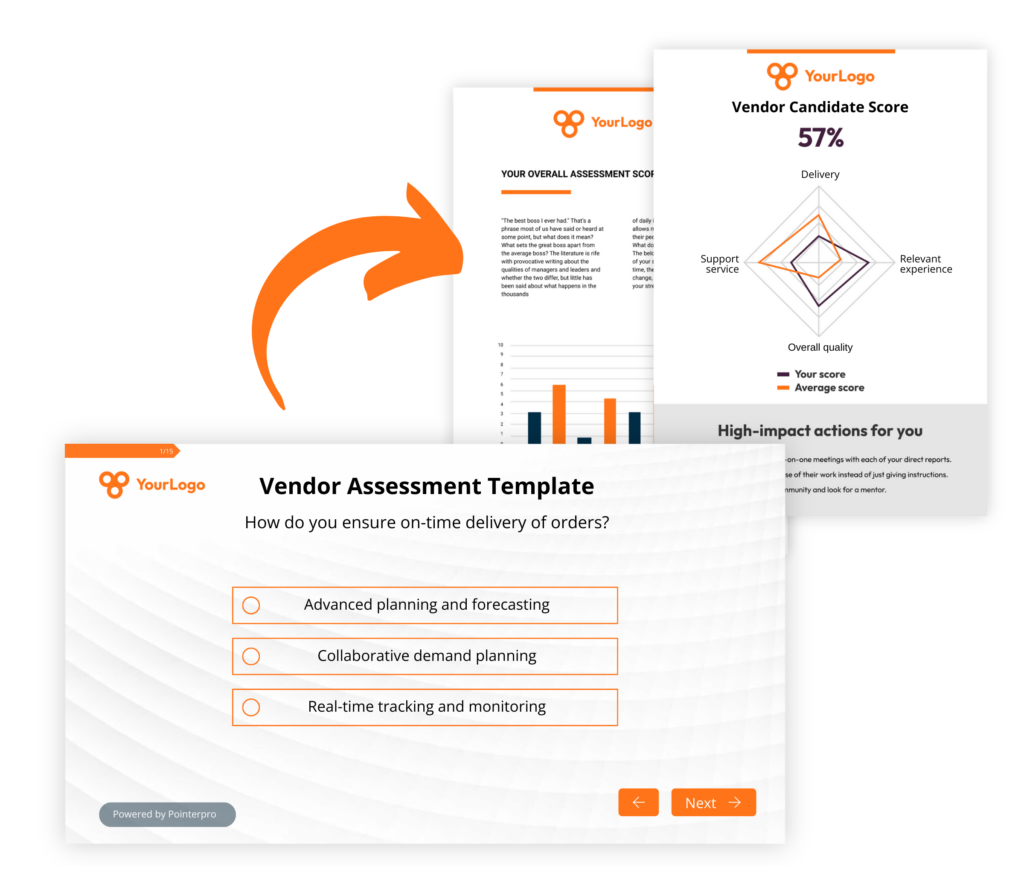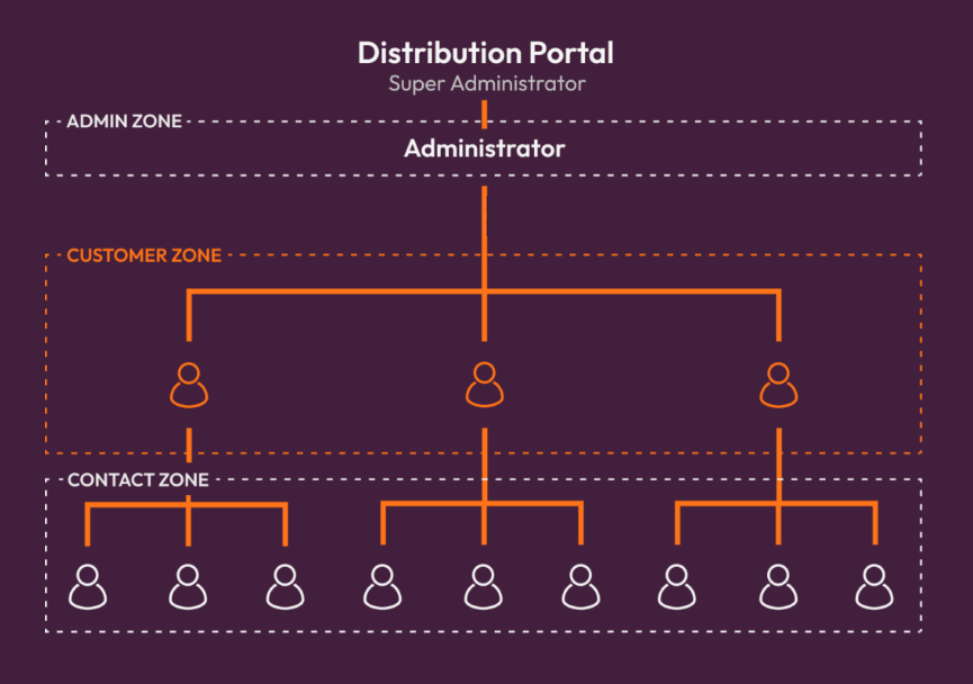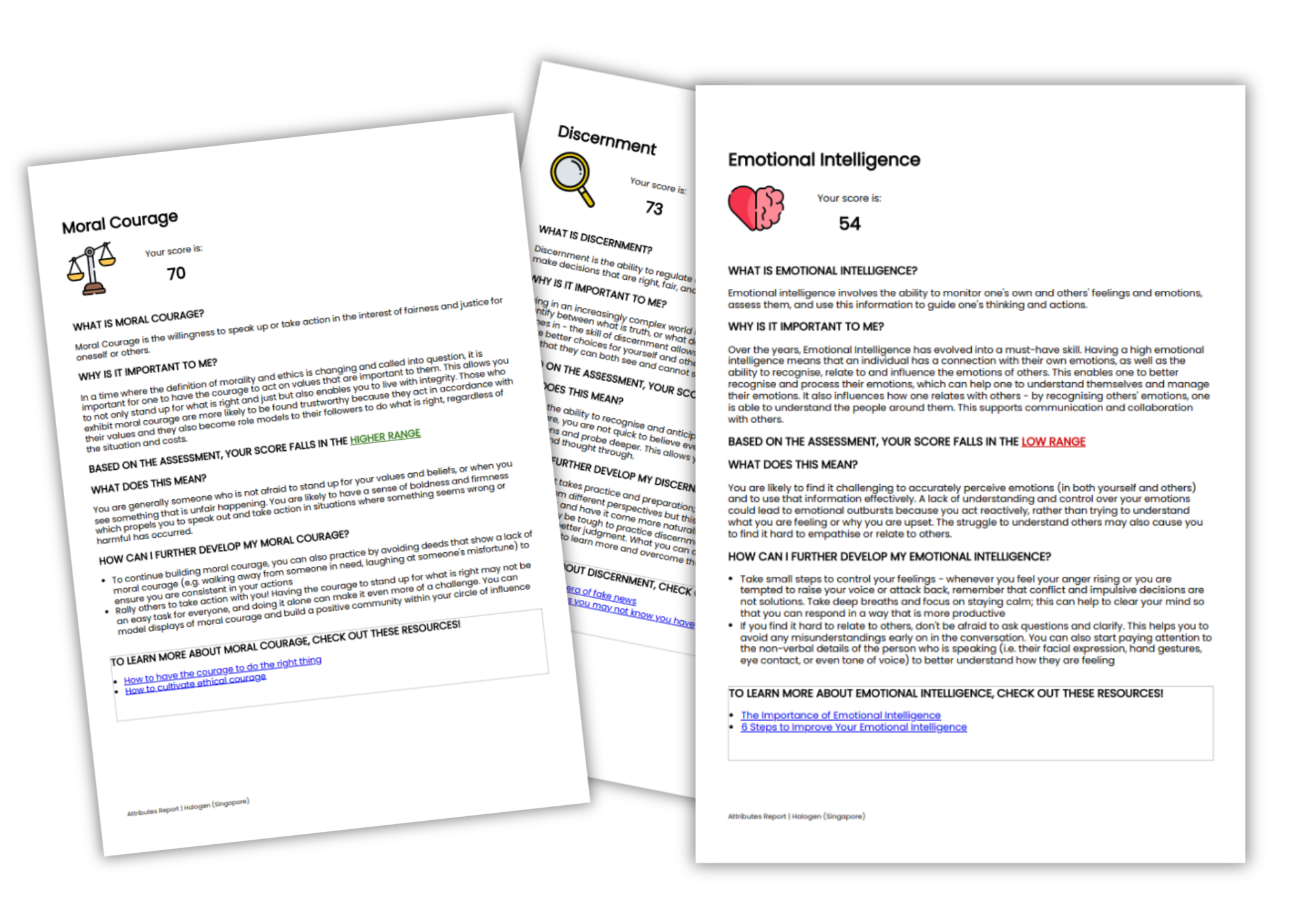Vendor assessment template
Choosing tends to feel like losing. How do you really know you’re setting yourself up with the right vendor?
With a standardized vendor assessment, you evaluate potential partners objectively on every level that matters. With automated feedback, you inform stakeholders and vendors correctly.
Pointerpro is the 2-in-1 software that combines assessment building with custom PDF report generation.

What is a vendor assessment template?
As a seasoned procurement specialist, you’re always on a mission to find the perfect supplier for whatever it is your company needs right now. New office supplies, for instance. With a stack of proposals on your desk, you know the weight of responsibility in making this decision. It’s not just about picking the cheapest option; it’s about finding a partner who aligns with your company’s values, delivers quality products on time, and provides excellent customer service. There’s a whole list of things that matters.
Thanks to your experience, you know how to evaluate a vendor. But going through the process all over again for every candidate, for every single need… It’s just time-consuming. But you don’t want to lower your standards.
This is where constructing your own vendor assessment template proves to be a godsend. It boils down to a standardized list of key questions. They allow you to methodically evaluate each vendor against crucial criteria. That way you ensure your company gets not just the best deal, but the best fit.
By pouring your vendor assessment template questions into a tool like Pointerpro, you automate your vendor process. Thanks to question logic, custom scoring, and report-building functionalities, all you need to do is have any vendor candidate fill out your form. As a result, both the vendor and your internal stakeholders automatically receive a custom report. And you take it from there.
3 reasons to use Pointerpro as a vendor assessment tool
3 reasons to use Pointerpro as a vendor assessment tool
Interactive user experience
With the Questionnaire Builder, you get to create an engaging feedback form. How? With numerous design and layout options, useful widgets, and countless question types.
Refined, score-based analysis
Our custom scoring engine helps you quantify and categorize diverse answers. The result? An objective and nuanced vendor assessment that helps split the wheat from the chaff.
Automated feedback in PDF
Thanks to your setup in the Report Builder, stakeholders get a detailed vendor report in a beautifully designed and branded PDF: with personalized and objective feedback.
1.500+ businesses worldwide build assessments with Pointerpro









Why is a vendor assessment template important?
Using vendor assessment templates is a game-changer. They make life easier by streamlining the vendor evaluation process, and they keep things fair with consistent data and scoring methods. Plus, they help you dodge those sketchy vendors and set clear expectations for everyone involved.
A standardized evaluation method like this is also a building block for trust. It proves you’re objective and therefore makes it easier to have constructive conversations with suppliers. Especially when your vendor assessment delivers a personalized report that explains to the vendor candidate where he or she stands. It showcases your professionalism and your commitment to securing the optimal supplier for your organization.
How to create your vendor assessment template?
Creating a vendor assessment template involves several steps to ensure it effectively meets your needs. Here’s a simplified guide to help you get started:
- Define your objectives: Determine the purpose of your vendor assessment template. What specific criteria are important to evaluate vendors? What are your goals in assessing vendors?
- Identify key evaluation criteria: Brainstorm and identify the main factors you'll use to evaluate vendors. This may include factors such as pricing, quality, reliability, customer service, delivery times, compliance with regulations, etc.
- Design the template structure: Decide on the format and structure of your template. Consider using a spreadsheet format (e.g., Excel or Google Sheets) for ease of use and organization. Create columns for each evaluation criterion and rows for each vendor.
- Establish a scoring system: Determine how you'll score each criterion. You can use numerical scales, rating systems (e.g., excellent, good, fair, poor), or a combination of both. Ensure that the scoring system aligns with your objectives and provides meaningful insights.
- Gather input from stakeholders: Collaborate with relevant stakeholders, such as procurement team members, department heads, and end-users, to gather input on the evaluation criteria and scoring system. This ensures that the template reflects the needs and priorities of all stakeholders.
- Customize for specific needs: Tailor the template to your organization's specific requirements and industry standards. You may need to include additional sections or criteria based on your unique needs and preferences.
- Test and refine: Before officially deploying the template, test it with a small sample of vendors to identify any areas for improvement. Solicit feedback from users and refine the template accordingly to ensure usability and effectiveness.
- Regularly review and update: Schedule regular reviews of the vendor assessment template to ensure its relevance and effectiveness. Update criteria, scoring systems, or any other aspects as needed to adapt to changing business needs and evolving vendor landscapes.
By following these steps, you can create a comprehensive and user-friendly vendor assessment template that helps streamline your procurement process and ensures informed vendor selection decisions.
How to make your vendor assessment more sophisticated with custom scoring
The power of a sophisticated vendor assessment resides in the score-based questionnaire it’s based on. What it means is this: You make your evaluation more sophisticated by attributing more weight to specific requirements. Because let’s face it: While everything’s important, everything isn’t necessarily equally important.
In the video below, Pointerpro’s Product Director Bruno explains what custom scoring is:
Assessing current partners: Vendor performance evaluation sample
Effective vendor management doesn’t end with assessing new candidates, as you know. It also implies regularly evaluating existing vendors.
While the initial vendor selection process is important, ongoing assessment of current vendors ensures that they continue to meet your organization’s needs. Bear in mind that these needs involve. So it’s important to check in very regularly with all the levels of the organizaton.
By conducting periodic evaluations – through a different set of vendor assessment templates, if you will – you identify areas for improvement, address any performance issues promptly, and foster stronger relationships with your vendors. Moreover, evaluating current vendors allows your organization to stay informed about market trends, explore opportunities for innovation and optimization for long-term success.
Vendor performance metrics
Vendor performance metrics are key performance indicators (KPIs) used to measure and track the performance of vendors. Common vendor performance metrics include:
- On-time delivery rate: Percentage of orders or services delivered on time as promised
- Lead time: The average time taken from order placement to delivery.
- Responsiveness: Speed and effectiveness of vendor's response to inquiries, issues, or complaints.
- Communication effectiveness: Ability of the vendor to communicate clearly and promptly.
- Contract compliance: Adherence to contractual terms, including pricing, terms, and conditions.
- Innovation: The degree to which the vendor introduces new ideas, technologies, or processes to improve performance.
- Cost savings achieved: Measure of cost savings or cost avoidance achieved through the vendor's products or services.
- Flexibility and adaptability: Ability of the vendor to adapt to changing requirements or unforeseen circumstances.
- Customer satisfaction rate: The satisfaction of different stakeholders in your organization)
- Financial stability: Evaluation of the vendor's financial health and stability.
- Warranty and support: Quality and effectiveness of post-sales support, warranty, and maintenance services provided.
By tracking these metrics, your organization can identify areas for improvement and make data-driven decisions when evaluating vendor performance.
Best practices for evaluating vendor performance
When evaluating vendor performance, it is important to follow best practices to ensure a fair and objective assessment.
The actual vendor assessment template or templates you build should probably be destined for various stakeholders so that you can get a 360 view on things. For example: You could administer one assessment to get input from the vendors in question and administer another to the internal stakeholders in your company. You can use Pointepro’s Aggregated Reports functionality to establish group or benchmark reports.
Some additional best practices for evaluating vendor performance include:
- Establishing clear evaluation criteria (or questions/answers) that can be compared across respondents
- Integrating for open-ended feedback in your vendor assessment templates to get nuanced feedback on top of quantitative evaluations
- Providing constructive feedback based on potential scores on answers so that the assessment process is experienced as an interaction rather than a dry evaluation
And whatever you do, hold on to the data you collect. It can prove more valuable than you’d expect in the long run.
Vendor assessment example questions
Here are 30 vendor assessment example questions divided into 3 categories
- 10 candidate vendor assessment example questions
- 10 current vendor assessment example questions for end users
- 10 current vendor assessment example questions for department managers
10 candidate vendor assessment example questions
- How do you ensure the quality and consistency of your products/services?
- What is your process for handling and resolving customer complaints or issues?
- How do you ensure on-time delivery of orders?
- Can you provide examples of your experience working with similar clients or industries?
- What measures do you have in place to mitigate risks to supply chain disruptions?
- How do you stay informed about industry trends and changes?
- What sustainability practices do you implement in your operations?
- How do you handle warranty claims and post-sales support?
- What initiatives do you have in place for continuous improvement
- Can you provide references from current or past clients?
These vendor assessment template questions focus on key areas that are essential for evaluating potential vendors’ capabilities, reliability, and suitability for partnership. They delve into aspects such as quality control, customer service, supply chain management, industry experience, sustainability practices, and commitment to continuous improvement.
By seeking detailed responses from vendors on these critical topics, your organization can gain insights into their prospective partners’ operations, values, and ability to meet their specific needs. This approach ensures a comprehensive evaluation process that enables informed decision-making and fosters successful vendor relationships.
10 current vendor assessment example questions for end users
- How satisfied are you with the quality of the products/services provided by the vendor?
- Have you experienced any issues or challenges with the vendor's products/services? If yes, please specify.
- How would you rate the vendor's responsiveness to inquiries, concerns, or complaints?
- Have there been any instances of delayed deliveries or missed deadlines from the vendor? If yes, please provide details.
- How well does the vendor communicate important updates or changes related to their products/services?
- Are there any areas where you believe the vendor could improve their performance or service delivery?
- Do you feel that the vendor meets your organization's needs and expectations effectively?
- How would you rate the overall reliability of the vendor in terms of delivering consistent results?
- Have you encountered any issues related to billing, invoicing, or pricing transparency with the vendor?
- Would you recommend this vendor to other departments or organizations based on your experience?
These vendor performance evaluation questions focus on gathering feedback directly from the end-users of the vendor’s products or services. Their experiences and perspectives are invaluable in assessing the vendor’s performance, as they are the ones directly impacted by the quality, reliability, and responsiveness of the vendor.
The questions are designed to capture a comprehensive view of the vendor’s performance, including aspects such as product/service quality, communication, reliability, and overall satisfaction. By soliciting input from users, organizations can gain insights into areas where vendors excel and areas where they need to improve. Ultimately, all this will foster stronger vendor relationships and optimizing vendor management processes.
10 current vendor assessment example questions for department managers
- How effectively does the vendor's products/services meet the specific needs of your department?
- Have you encountered any challenges or limitations in utilizing the vendor's products/services within your department? If yes, please elaborate.
- How responsive is the vendor to addressing the unique requirements and concerns of your department?
- Have there been any instances where the vendor failed to meet the agreed-upon specifications or deliverables for your department? If yes, please provide details.
- How would you rate the level of collaboration and communication between your department and the vendor?
- Are there any areas where you believe the vendor could enhance their offerings or better support your department's objectives?
- Do you perceive the vendor as a strategic partner in helping your department achieve its goals?
- How satisfied are you with the vendor's performance in terms of meeting deadlines and project timelines for your department?
- Have there been any issues related to contract terms, billing, or pricing negotiations with the vendor from your department's perspective?
- Based on your department's experience, would you recommend continuing the partnership with this vendor? Why or why not?
These vendor evaluation questions are tailored to solicit feedback from key stakeholders, namely department managers within the organization. These individuals play a critical role in assessing the vendor’s performance, as they have firsthand experience with the vendor’s products/services and interactions.
The questions are designed to capture insights specific to each department’s needs, challenges, and objectives, ensuring a comprehensive evaluation of the vendor’s performance from multiple perspectives. By gathering input from department managers, organizations can identify areas of strength and areas for improvement in their vendor partnerships, ultimately driving better alignment with departmental goals and objectives.
What Pointerpro clients are saying




How do you manage the distribution of your vendor assessments?
As explained above, you can distribute a wide variety of vendor assessments. They can be both assessments for potential or current vendors to respond to, but just as well for stakeholders to respond to.
Imagine you really want to gather feedback from every single end user of a vendor’s services or products within your organization. Maybe your organization counts hundreds of people? In that case, it can be daunting to manage the distribution and making sure respondents take the assessments so that the data come in.
What you don’t want to do is send email reminder after email reminder to everyone, do you? With Pointerpro, you don’t have to. And that’s thanks to the Distribution Portal:

As an administrator of your Distribution Portal, you get department managers to administer the assessments to their staff – by using the customer zone of the Distrbution Portal. From there, they also take care of the follow-up, when staff members are forgetting to fill out their assessments. You can even foresee a contact zone for these staff members to log onto. That way, they get to proactively follow up on the assessments they need to respond to.
Key tip: Set up a consistent evaluation process. Establish standardized procedures and protocols for conducting vendor assessments across departments or teams within the organization. Ensure consistency in evaluation criteria, scoring methods, and decision-making processes.
Additional recommendations for your vendor assessment template
Whatever software you end up working with to build your vendor assessments, consider the following items and their impact on yourself and your organization:
- Customization: Tailor the template to align with the unique needs, priorities, and industry standards of your organization. Consider including specific criteria or metrics that are relevant to your business operations and objectives.
- Scalability: Design the template to accommodate scalability as your organization grows or as vendor relationships evolve. Ensure flexibility to add or modify evaluation criteria and scoring mechanisms as needed.
- User-friendly interface: Create a user-friendly interface that is easy to navigate and understand for respondents and other stakeholders involved in the assessment process.
- Clear instructions throughout questionnaires: Provide clear instructions and guidelines within the template to assist users in completing the assessment accurately and efficiently. Include explanations of each evaluation criterion and how to interpret scoring.
- Regular updates: Establish a schedule for reviewing and updating every vendor assessment template to ensure its relevance and effectiveness over time. Incorporate feedback from users and stakeholders to identify areas for improvement.
- Integration with vendor management systems: If applicable, integrate the vendor assessment template with existing vendor management systems or software platforms to streamline data collection, analysis, and reporting processes.
Create your first vendor assessment today
You may also be interested in
Recommended reading

Vlerick Business School digitalizes entrepreneurship development with Pointerpro [case study]
What do a top-tier international business school based in the capital of Europe and Pointerpro have in common? At the

Attain Global: How to do psychometric tests right and build a cutting-edge international business [case study]
In many countries worldwide, the pursuit of skillful and engaged employees is not so much a war on talent as

How youth development specialist Halogen reaches thousands of young Singaporeans with Pointerpro [case study]
Singapore, in Southeast Asia, is a global, economic powerhouse with a population of a little less than 6 million people.


